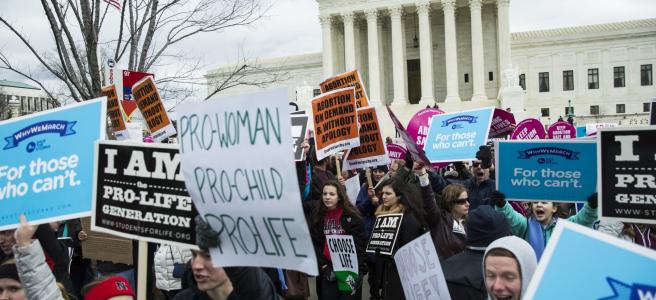
Amanda Michelle Gomez | 4/19/2019
ANTI-CHOICE DEMONSTRATORS TRY TO BLOCK PRO-CHOICE SUPPORTERS IN FRONT OF THE SUPREME COURT DURING THE ANNUAL MARCH FOR LIFE ON THE ANNIVERSARY OF THE HISTORIC ROE V. WADE SUPREME COURT RULING IN WASHINGTON ON JANUARY 27, 2017. (CREDIT: SAMUEL CORUM/ANADOLU AGENCY/GETTY IMAGES)
Attorneys general in Michigan and New Mexico are pledging not to prosecute pregnant people or providers should Roe v. Wade be overturned. Both states would criminalize abortion in the event that the Supreme Court landmark decision is overturned — making these statements all the more powerful.
“I will never prosecute a woman, or her doctor, for making the difficult decision to terminate a pregnancy,” said Michigan Attorney General Dana Nessel (D) at a press conference on Tuesday.
Following her announcement, New Mexico Attorney General Hector Balderas (D) told ThinkProgress he also would commit to not prosecuting abortion-related cases.
“Every New Mexican woman should have the ability, under the law, to seek the best medical care and family planning services for themselves,” said Balderas in a statement. “I will always stand with New Mexican women, who should never be criminalized for seeking access to their own reproductive rights.”
Both Michigan and New Mexico have laws pre-dating Roe that criminalize abortion. In Michigan, thanks to a 1931 law, a doctor could be found guilty of a felony for performing an abortion, unless it’s to save the pregnant person’s life. New Mexico also has a decades-old law that would make it a felony to administer an abortion, except in narrow circumstances, if Roe is overturned.
The authority of the attorney general widely varies from state to state. In Michigan, for example, the office of the attorney general can intervene in a criminal case, which could include abortion-related cases in a post-Roe world.
“In New Mexico, the Office of the Attorney General does have jurisdiction to enforce the abortion law, although they also have discretion to decide whether to enforce,” said Maryam Ahranjani, an assistant professor at the University of New Mexico School of Law.
“That statement means something,” she said, of Balderas’ pledge.
But at a minimum, in every state, the attorney general, sets the tone as the top law enforcement officer.
“How it’s going to interpreted or the influence it has and whether it leads district attorneys in the direction of the [attorney general’s] opinion… depends on the relationship and politics and culture of those offices,” said Jill Adams, executive director of If/When/How: Lawyering for Reproductive Justice.
“We hope other attorneys general follow AG Nessel’s lead and declare they will not abuse the powers of their office by criminalizing people who have abortions,” added Adams.
ThinkProgress reached out to attorneys general living in the 14 states where abortion bans could be enforced if Roe is overturned, and only two offices other than New Mexico responded. Neither would commit to following Nessel’s lead, pointing to a difference in state laws.
“Under the Arkansas Constitution, the Attorney General does not have any authority to prosecute cases; that duty is left to the elected prosecutors of the state,” said communications officer Amanda Priest in a statement to ThinkProgress. “Nevertheless, Attorney General [Leslie Rutledge (R)] strongly believes that Roe and Casey were wrongly decided and stands for protecting the lives of the unborn.”
In North Dakota, it’s the county state’s attorney, not the attorney general, who has jurisdiction or authority over prosecution of criminal offenses; there are 53 counties.
“The county state’s attorneys do not fall under the supervision or authority of this office and do not answer to us,” said public information officer Liz Brocker, in a statement to ThinkProgress.
Even if a current sitting prosecutor says they won’t pursue the case, the next one might. In Michigan, for example, the statute of limitations — or the time a prosecutor has to file criminal charges — is between six and 10 years.
With so many anti-abortion cases before the Supreme Court, which now leans conservative, there’s a real possibility that Roe could be overturned.
Given this possibility, attorneys general could be emboldened to speak out for a symbolic purpose. Some are going even further. Texas Attorney General Ken Paxton (R), for one, is asking the legislature for authority to prosecute abortion-related cases.
Legislatures could overturn laws so attorneys general aren’t given the option to prosecute abortion. Lawmakers in Massachusetts and New York overturned their decades-old laws criminalizing abortion. There was a concerted effort to repeal New Mexico’s ban, but the bill failed in the Democratic-controlled Senate last month.
“Abortion is a matter of health care, not a criminal act. In states across the country, outdated and dangerous laws remain on the books that would turn women or providers into criminals,” Andrea Miller, president of the National Institute for Reproductive Health, said in a statement to ThinkProgress.
“We need to repeal these laws — and in the meantime, we need more attorneys general following the lead of AG Nessel in ensuring that no one goes to jail for seeking or providing an abortion,” she said.
This post has been updated to correct Jill Adams’ affiliation. Jill is the founder of SIA Legal Team, but is currently the executive director of If/When/How: Lawyering for Reproductive Justice.

